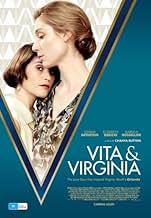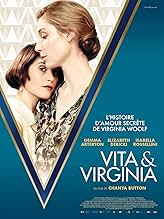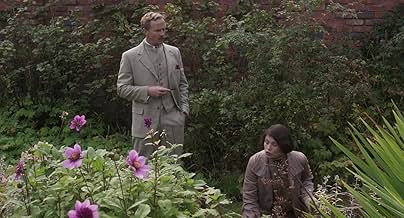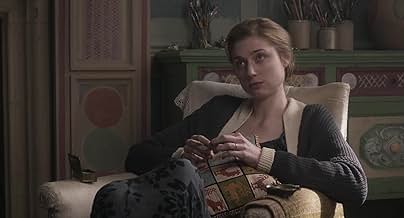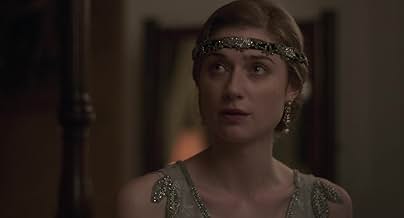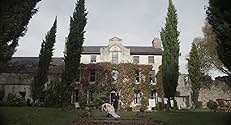ÉVALUATION IMDb
5,9/10
5,2 k
MA NOTE
La fascinante histoire d'amour entre l'écrivain populaire mondaine Vita Sackville-West et l'icône littéraire Virginia Woolf.La fascinante histoire d'amour entre l'écrivain populaire mondaine Vita Sackville-West et l'icône littéraire Virginia Woolf.La fascinante histoire d'amour entre l'écrivain populaire mondaine Vita Sackville-West et l'icône littéraire Virginia Woolf.
- Prix
- 1 victoire et 2 nominations au total
Avis en vedette
With all the scathing reviews, Vita & Virginia still had me from beginning to end.
Its prose exudes seductive eloquence; call me a hopeless romantic but the picture as a whole is like a beautiful ballad or poetry. The synth-pop-esque score feels refreshing against the 1920s backdrop, it doesn't feel out of place; and the cinematography is sleek (I immediately developed a particular fondness towards Virginia's 'hallucinations'). When it comes to the love scenes: less is more, n'est-ce pas?
(Vita and Virginia) is carefully, delicately weaved and it's beautiful in every sense of the word. Rarely do I show this much affection towards a film I've only seen once; but this had me, it just did.
Don't let other reviews deter you from giving it a chance...all it really needs is the right audience.
Its prose exudes seductive eloquence; call me a hopeless romantic but the picture as a whole is like a beautiful ballad or poetry. The synth-pop-esque score feels refreshing against the 1920s backdrop, it doesn't feel out of place; and the cinematography is sleek (I immediately developed a particular fondness towards Virginia's 'hallucinations'). When it comes to the love scenes: less is more, n'est-ce pas?
(Vita and Virginia) is carefully, delicately weaved and it's beautiful in every sense of the word. Rarely do I show this much affection towards a film I've only seen once; but this had me, it just did.
Don't let other reviews deter you from giving it a chance...all it really needs is the right audience.
First, let me say I'd go see Gemma Arterton reading the phone book: she has the rare facility of being able to play period stories as well as contemporary ones. She's great as Gemma Bovery and the Duchess of Malfi. She's well supported by Isabella Rossellini as Lady Sackville who tries without success to call Vita back to reality.
Second, what quirk of casting gave us Elizabeth Debicky, not yet thirty, as Virginia Woolf who started her three-year relationship (1925-28) with Vita at age 43? She just can't carry off the part of a woman in early middle age, and what's more she has this irritating drawl/vocal fry that put me off for most of the picture. So if you wish to see this interesting story, be aware it's been handled before (Portrait of a Marriage, The Hours) and sometimes better.
Second, what quirk of casting gave us Elizabeth Debicky, not yet thirty, as Virginia Woolf who started her three-year relationship (1925-28) with Vita at age 43? She just can't carry off the part of a woman in early middle age, and what's more she has this irritating drawl/vocal fry that put me off for most of the picture. So if you wish to see this interesting story, be aware it's been handled before (Portrait of a Marriage, The Hours) and sometimes better.
2018 saw several historical dramas about lesbianism, including the fictitious "Tell It to the Bees" and three about real historical figures, even if doubts have sometimes been expressed about their historical accuracy. "The Favourite" dealt with the triangular relationship between Queen Anne, Sarah Churchill and Abigail Masham, and "Colette" told the story of the bisexual French novelist of that name. "Vita & Virginia" is about two more bisexual literary figures, Vita Sackville-West and Virginia Woolf.
As the story opens, in the England of the 1920s, Vita and Virginia are both well-known writers, but do not know each other personally because they move in different social circles. Vita is a politically and socially conservative aristocrat, whereas Virginia is part of the liberal, progressive Bloomsbury Group. Now that Virginia Woolf has become such a well-established part of the canon of English Literature ("From Beowulf to Virginia Woolf"), it seems strange to think that during their lifetimes it was Vita Sackville-West who was regarded as the more significant writer, both in terms of book sales and in terms of critical acclaim.
Vita, however, is fascinated by the other woman's work, and is determined to make her acquaintance. The two women, as portrayed here by Gemma Arterton and Elizabeth Debicki, are very different in personality. Debicki's Virginia is shy and retiring, and physically and mentally frail, whereas Arterton's Vita is outgoing, lively and magnetic. (Was Vita's vitality, I wonder, the reason for her nickname? She was officially baptised Victoria Mary, but was always known as Vita, Latin for "life"). When the two meet, however, they quickly become friends, despite their differences, and eventually lovers. Her relationship with Vita inspires Virginia's "Orlando", one of her best-known novels and her first major popular success.
One criticism that has been made is that Debicki is too young for the role of Virginia, and there is some justice in this. Virginia she was the older of the women by eight years, but Debicki is four years younger than Arterton. At least, however, she doesn't rely upon a false nose like Nicole Kidman did when playing Virginia in "The Hours".
Both women were married, and their husbands play important, if subsidiary, roles in this drama. Vita had a famously open marriage to the diplomat Harold Nicolson, who was himself bisexual and had relationships with other men. In the film he is depicted as having no objection to his wife's lesbian friendships, although he does wish she could be more discreet about them. (Her previous affair with Violet Trefusis caused a scandal which damaged his career). Virginia's publisher husband Leonard is not enthusiastic about her relationship but feels it is for the best if he tolerates it, given her fragile mental state.
Some may think that the film is too passionless, a presentation of a well-mannered, drawing-room form of lesbianism. Again, there might be some justice in this, although I suspect that such criticisms are most likely to come from those who expected, and hoped, that the film would be more sensual and erotic than it actually is. The film was never intended to be a piece of erotica, and I think that there are reasons why it is less passionate than one might expect. In the first place, it deals with events which took place nearly a hundred years ago, a period when the British still believed in the idea of the "stiff upper lip", far more than they do today. As a result people tended to behave in a more restrained manner, at least in public; open displays of strong feelings were discouraged. This was especially true when those feelings existed between two women; although lesbianism, unlike male homosexuality, was never illegal in Britain, it was still the subject of great social disapproval.
Secondly, in the version of events put forward here, Vita has had several earlier affairs with other women, whereas this is Virginia's first lesbian relationship. Debicki plays her not as a woman in the throes of a grand passion but as someone rather uncertainly exploring and discovering new aspects of her sexuality. The result is a film which is certainly restrained, but this seems appropriate to its period and to its subject-matter. It is, in fact, the restraint with which writer-director Chanya Button and her co-writer Eileen Atkins bring to their story which enables them to explore the psychology of their two main characters in such depth. 7/10
As the story opens, in the England of the 1920s, Vita and Virginia are both well-known writers, but do not know each other personally because they move in different social circles. Vita is a politically and socially conservative aristocrat, whereas Virginia is part of the liberal, progressive Bloomsbury Group. Now that Virginia Woolf has become such a well-established part of the canon of English Literature ("From Beowulf to Virginia Woolf"), it seems strange to think that during their lifetimes it was Vita Sackville-West who was regarded as the more significant writer, both in terms of book sales and in terms of critical acclaim.
Vita, however, is fascinated by the other woman's work, and is determined to make her acquaintance. The two women, as portrayed here by Gemma Arterton and Elizabeth Debicki, are very different in personality. Debicki's Virginia is shy and retiring, and physically and mentally frail, whereas Arterton's Vita is outgoing, lively and magnetic. (Was Vita's vitality, I wonder, the reason for her nickname? She was officially baptised Victoria Mary, but was always known as Vita, Latin for "life"). When the two meet, however, they quickly become friends, despite their differences, and eventually lovers. Her relationship with Vita inspires Virginia's "Orlando", one of her best-known novels and her first major popular success.
One criticism that has been made is that Debicki is too young for the role of Virginia, and there is some justice in this. Virginia she was the older of the women by eight years, but Debicki is four years younger than Arterton. At least, however, she doesn't rely upon a false nose like Nicole Kidman did when playing Virginia in "The Hours".
Both women were married, and their husbands play important, if subsidiary, roles in this drama. Vita had a famously open marriage to the diplomat Harold Nicolson, who was himself bisexual and had relationships with other men. In the film he is depicted as having no objection to his wife's lesbian friendships, although he does wish she could be more discreet about them. (Her previous affair with Violet Trefusis caused a scandal which damaged his career). Virginia's publisher husband Leonard is not enthusiastic about her relationship but feels it is for the best if he tolerates it, given her fragile mental state.
Some may think that the film is too passionless, a presentation of a well-mannered, drawing-room form of lesbianism. Again, there might be some justice in this, although I suspect that such criticisms are most likely to come from those who expected, and hoped, that the film would be more sensual and erotic than it actually is. The film was never intended to be a piece of erotica, and I think that there are reasons why it is less passionate than one might expect. In the first place, it deals with events which took place nearly a hundred years ago, a period when the British still believed in the idea of the "stiff upper lip", far more than they do today. As a result people tended to behave in a more restrained manner, at least in public; open displays of strong feelings were discouraged. This was especially true when those feelings existed between two women; although lesbianism, unlike male homosexuality, was never illegal in Britain, it was still the subject of great social disapproval.
Secondly, in the version of events put forward here, Vita has had several earlier affairs with other women, whereas this is Virginia's first lesbian relationship. Debicki plays her not as a woman in the throes of a grand passion but as someone rather uncertainly exploring and discovering new aspects of her sexuality. The result is a film which is certainly restrained, but this seems appropriate to its period and to its subject-matter. It is, in fact, the restraint with which writer-director Chanya Button and her co-writer Eileen Atkins bring to their story which enables them to explore the psychology of their two main characters in such depth. 7/10
The play on which this movie is based works well on stage. A couple of actors bring to life the letters of Virginia Woolf and Vita Sackville-West. It's simple and effective. The flim also uses the letters as the basis of the script, but the screenplay hasn't converted the literary tone into something speakable. The result is a thick porridge of words that doesn't sound remotely like living language . Even the best performance -- and it really is excellent -- by Elizabeth Debecki as Mrs Woolf, can't escape from the impossible pretension of the stuff coming out of her character's mouth. The accents, too, even Debecki's, have clearly been tirelessly worked on and worked over: few people sound real or believeable. Less accomplished cast members (of whom there are several) haven't a hope.
The film as a whole is similarly stilted. In spite of occasional (and welcomely effective) poetic visual flourishes, the film is so freighted with the weight of period frocks, settings and props, that it never takes flight. Only Isobel Waller-Bridge's music, liberated from period accuracy, escapes the self-consciousness that paralyses other departments.
The worst aspect of this tedious movie is that it takes the Bloomsbury set at their own estimate. This one's a genius, that one's a rebel, she is daring, he is boring....Whatever their talents may or may not have been, they are presented, uncritically, as so wrapped up in themselves, so hopelessly removed, in their privilege bubble, from the daily grind of the society around them, that there's no reason at all to be interested in their self-regard and self-induced melodramas.
A very poor effort indeed.
The film as a whole is similarly stilted. In spite of occasional (and welcomely effective) poetic visual flourishes, the film is so freighted with the weight of period frocks, settings and props, that it never takes flight. Only Isobel Waller-Bridge's music, liberated from period accuracy, escapes the self-consciousness that paralyses other departments.
The worst aspect of this tedious movie is that it takes the Bloomsbury set at their own estimate. This one's a genius, that one's a rebel, she is daring, he is boring....Whatever their talents may or may not have been, they are presented, uncritically, as so wrapped up in themselves, so hopelessly removed, in their privilege bubble, from the daily grind of the society around them, that there's no reason at all to be interested in their self-regard and self-induced melodramas.
A very poor effort indeed.
I have to admit, I am only borrowing or tweaking a title of another movie because it does fit quite perfectly here. I am not a scholar of either of the two real life figures portrayed here and could not tell you how much of what we see here supposedly happened exactly the way it is shown. Or close to the way it is shown I reckon.
Having said that, it seems to be another forbidden love situation. Extremely good acting and the mentioned setting make this a movie that some will love a lot. On the other hand, since the pacing is slow and the time period may not be to everyones taste, there may also be a lot of dislike to what is being served.
Vita and Virginia - as the title suggests the movie draws its power mostly from the interaction of these two characters - which is more than enough for me.
Having said that, it seems to be another forbidden love situation. Extremely good acting and the mentioned setting make this a movie that some will love a lot. On the other hand, since the pacing is slow and the time period may not be to everyones taste, there may also be a lot of dislike to what is being served.
Vita and Virginia - as the title suggests the movie draws its power mostly from the interaction of these two characters - which is more than enough for me.
Le saviez-vous
- AnecdotesBoth this film and the play on which it is based were derived from letters between Vita Sackville-West and acclaimed author Virginia Woolf.
- GaffesDriving in a convertible with the top down, neither woman has windblown hair.
- Citations
Harold Nicolson: I hear nothing but reports of her madness.
Vita Sackville-West: Madness, what a convenient way to explain away her genius.
- ConnexionsFeatured in London's Hollywood: Welcome to Pinewood (2006)
Meilleurs choix
Connectez-vous pour évaluer et surveiller les recommandations personnalisées
- How long is Vita & Virginia?Propulsé par Alexa
Détails
- Date de sortie
- Pays d’origine
- Site officiel
- Langue
- Aussi connu sous le nom de
- Віта і Вірджинія
- Lieux de tournage
- sociétés de production
- Consultez plus de crédits d'entreprise sur IMDbPro
Box-office
- Brut – États-Unis et Canada
- 42 741 $ US
- Fin de semaine d'ouverture – États-Unis et Canada
- 3 408 $ US
- 25 août 2019
- Brut – à l'échelle mondiale
- 800 675 $ US
- Durée1 heure 50 minutes
- Couleur
- Rapport de forme
- 1.85 : 1
Contribuer à cette page
Suggérer une modification ou ajouter du contenu manquant


![Regarder Trailer [OV]](https://m.media-amazon.com/images/M/MV5BZDRkNTdiN2MtNzE4MC00NDU1LThjOTMtMTA0YzEyYmQwOThlXkEyXkFqcGdeQXRyYW5zY29kZS13b3JrZmxvdw@@._V1_QL75_UX500_CR0)






